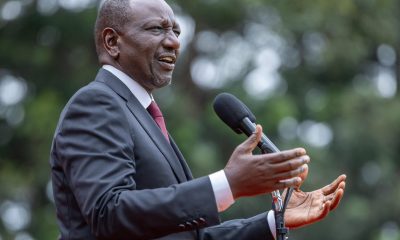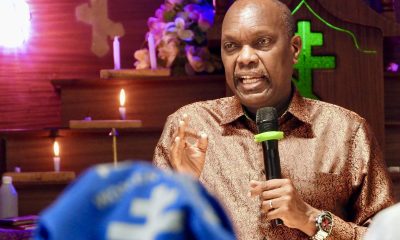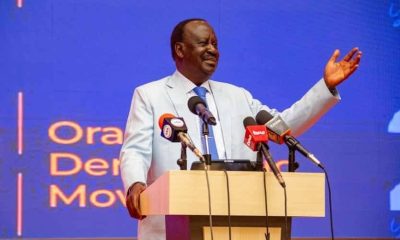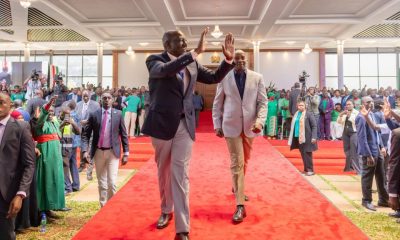Opinion
Kenya’s Case Was Redacted And The Economist Owes Its Readers the Full Picture
The problem here isn’t that the magazine published criticism, it’s that it declined to publish the facts used to rebut it.
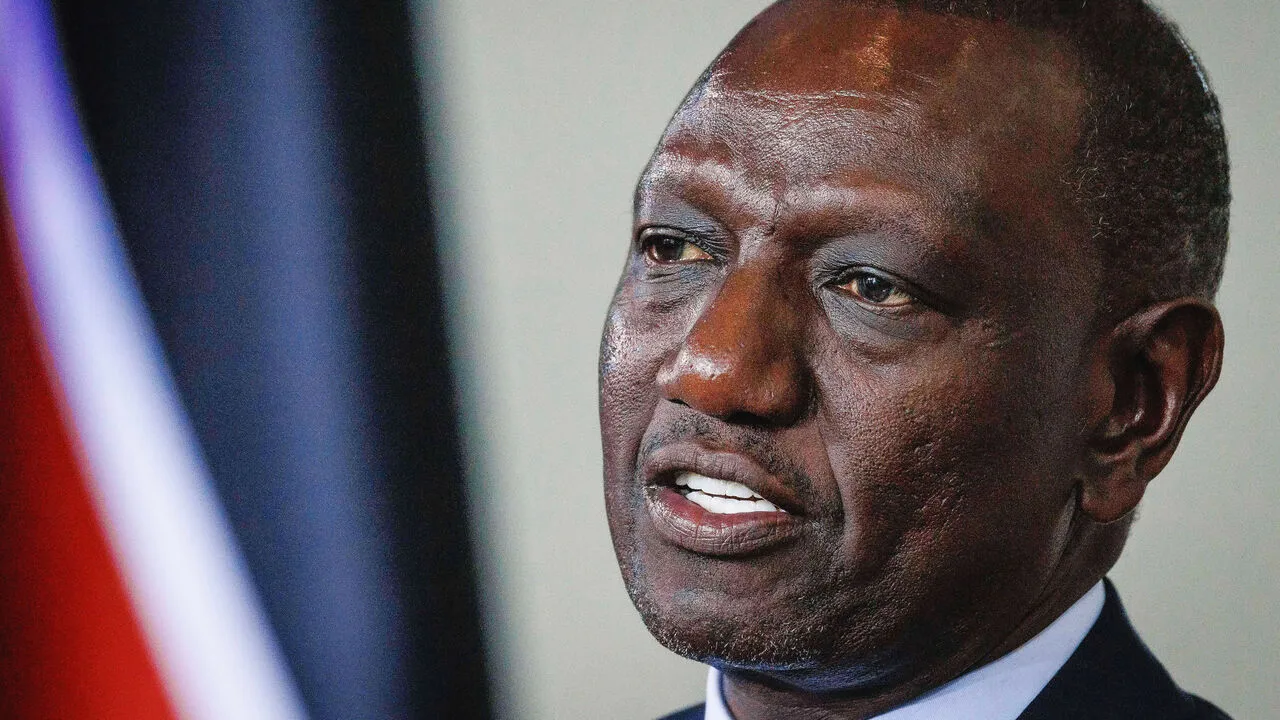
As a global economic publication, The Economist is no stranger to robust opinion. But its recent editorial choices regarding Kenya raise troubling questions not about policy or performance but about editorial integrity and selective disclosure.
On July 16th, The Economist published a letter from Kenya’s State House Spokesperson, Hussein Mohamed, in response to its earlier assertion that President William Ruto is steering Kenya into “dangerous” territory.
The magazine presented it as a right of reply. In reality, it was a heavily redacted response that excluded critical macroeconomic data, investor milestones, and structural reforms—facts that, if included, would have complicated its pessimistic narrative.
The original response which has since been made public (read the full text at the end of the article) by State House was a detailed and quantitative counterargument.
It laid out how, since 2022, Kenya has posted an average GDP growth of 5%, outperforming the global and Sub-Saharan averages.
The IMF projects GDP will reach $132bn in 2025, making Kenya the largest economy in East and Central Africa.
Inflation has dropped from 9.6% to 3.8%, foreign exchange reserves have risen to $11.8bn, and the shilling has appreciated 20% against the dollar.
These are not abstract figures. They speak to real stability in a turbulent region. Yet none of this was printed.
Nor were major structural developments such as the registration of 24 million citizens under a new universal healthcare regime, or the delivery of affordable housing for families previously living in informal settlements.
A credit revolution via the Hustler Fund, 400,000 new jobs via climate and construction programs, and increased agricultural earnings all were omitted.
Critique of political leadership is both legitimate and essential.
But when a publication requests a government response and then deletes large sections of its substance without acknowledgment it invites accusations of bias.
No one expects The Economist to adopt the Ruto administration’s line.
But a publication with such reach must avoid the appearance of shaping African narratives through selective editing.
The problem here isn’t that the magazine published criticism, it’s that it declined to publish the facts used to rebut it.
The Economist’s suggestion that President Ruto’s image is “tainted” and that he should consider stepping aside from a second term strays into political editorializing.
That decision lies with Kenyan voters, not with editors in London.
This episode is not isolated.
African governments particularly those attempting reform within a volatile post-COVID, debt-constrained landscape have long struggled to get balanced treatment from Western press.
Strong reform efforts are often dismissed as cosmetic, instability is assumed even when resilience is evident.
It is worth asking, had a European prime minister posted 5% growth, halved inflation, and appreciated the local currency 20% would their response to criticism have been edited so aggressively?
Kenya is not immune to challenges.
The Ruto administration faces legitimate scrutiny, particularly around youth unrest and the handling of public protests.
But critique must be met with an equal willingness to publish countervailing evidence especially when it arrives in structured, well-documented form.
What The Economist published was not a true right of reply. It was a curated excerpt that stripped out inconvenient truths.
For Kenya, and for the wider African continent, global credibility depends not just on reform at home but also on fair and complete representation abroad.
(Letter to The Economist by State House Spokesperson)
RIGHT OF REPLY: WILLIAM RUTO IS MAKING THE HARD CHOICES OTHERS FEARED, AND RESHAPING KENYA
In response to the recent article claiming that President William Ruto is leading Kenya to a “dangerous place,” this piece offers a fact-based counterview: Ruto is, in fact, making the hard choices others feared, and reshaping Kenya’s future through bold, necessary reforms.
To claim that Kenya has enjoyed political and economic stability for the past two decades, yet fail to acknowledge the overwhelming macro-economic indicators showing Kenya performing better than ever now, is not only disingenuous, but borders on willful ignorance, deliberate distortion, or outright malice.
For a platform as reputable as The Economist, such omissions are alarming. This response seeks to offer the facts that appear to have been either inadvertently overlooked or deliberately ignored.
President Ruto was elected on a platform of economic transformation and inclusion, promising to leave no one behind. Since independence, the majority of Kenyans, especially the poor, have been underserved by government policies and development programmes. The Kenya Kwanza administration’s agenda gives priority to agricultural productivity, affordable housing, universal healthcare, micro, small and medium enterprise reforms, access to affordable credit, broadband connectivity through the 100,000km digital superhighway roll-out, and the growth of the creative economy.
At the heart of all these interventions is job creation—an urgent need for the nearly one million youth who graduate annually, 80% of whom remain unemployed.
Two years into his administration, and despite global headwinds, including a post-COVID economic environment, a historic drought, a rising Federal Reserve interest rate, and a crippling debt crisis, the Kenyan economy has shown remarkable resilience and recovery—one that reflects the strength and effectiveness of President Ruto’s bold economic reforms.
Since August 2022, Kenya has recorded an average annual GDP growth rate of 5%, outperforming the global average of 3.3% and the regional average of 3.8%. In May 2025, the International Monetary Fund projected that Kenya’s GDP would reach $132 billion (KSh 17 trillion), making it the largest economy in East and Central Africa and the sixth-largest on the continent.
Inflation, which stood at 9.6% in October 2022, fell sharply to 3.8% by May 2025, well below Kenya Central Bank’s 5% target, bringing relief to millions of households.
The Kenyan shilling appreciated by nearly 20% against the US dollar (from KSh 162 to KSh 129), placing it among the best-performing currencies globally. The Central Bank Rate dropped from 13% to 9.75%, reducing borrowing costs and spurring private sector growth.
Meanwhile, foreign exchange reserves have grown to $11.8 billion, extending the import cover from 2.5 to 5 months.
These are not abstract figures; they represent real, tangible progress. To dismiss such indicators with a sweeping, pessimistic statement like “Kenya is facing a bleak future” is not only unfounded, but also a disservice to the truth and to the millions of Kenyans working hard every day to transform their country.
In May 2025, President Ruto handed over keys to over 1,000 families formerly living in Nairobi’s informal settlements, who now reside in the newly built Mukuru Estate developed under the Affordable Housing Programme. This initiative, ongoing in 42 of Kenya’s 47 counties, is set to deliver 150,000 housing units, while also creating more than 320,000 jobs in the housing value chain. For the first time in Kenya’s post-independence history, the long-promised dream of affordable housing is being realised.
Similarly, universal healthcare—another promise made and repeatedly broken over decades—is now taking shape under President Ruto’s administration. The Social Health Authority (SHA), launched in October 2024, has already registered 24 million Kenyans, up from just 7 million under a previous ineffective model that served only a privileged few. The SHA now delivers free primary healthcare, critical and chronic illness management, emergency care, and insured secondary healthcare.
In agriculture, targeted support and sectoral reforms have increased food production by 50%. Milk prices have risen from KSh35 to KSh50 a litre. Coffee farmers now earn up to KSh150 a kilo from KSh65. Tea earnings grew from KSh138 billion in 2022 to KSh215 billion in 2024. Sugar production jumped from 490,000 to 815,000 metric tonnes in just one year, reducing sugar imports by 70% and boosting farmer earnings from KSh50 billion to KSh90 billion.
Financial inclusion has expanded through the Hustler Fund, launched within three months of Ruto’s presidency, as promised. Over 25 million Kenyans have accessed loans totalling KSh70 billion, and the fund has mobilised KSh4.5 billion in savings. For the first time, millions previously excluded from formal credit systems are accessing financing through a revolutionary credit-rating model that does not rely on collateral like payslips or title deeds.
To address the urgent need to create opportunities for the hundreds of thousands of young men and women entering the labour market annually, President Ruto’s policies have significantly expanded employment opportunities. Over 320,000 jobs have been created through the Affordable Housing Programme, while the Climate Worx Programme—an ambitious initiative aimed at engaging youth across Kenya, particularly in informal settlements—has created an additional 110,000 jobs. This programme focuses on delivering essential public goods such as road construction, tree planting, and environmental sanitation.
Beyond domestic efforts, the government has also implemented strategies to facilitate labour mobility by securing job opportunities abroad. As a result, more than 400,000 Kenyans have been placed in international positions across healthcare, agriculture, construction, and other sectors. These efforts reflect a deliberate, structured approach to youth employment, grounded in practical interventions, policy foresight, and global engagement.
Additionally, Special Economic Zones and Export Processing Zones have attracted 80 companies and created over 14,000 jobs. Kenya has become a hub for major global tech companies, including Microsoft, Amazon Web Services, and Apple. Just last week, during President Ruto’s visit to the United Kingdom, BUPA Global, Africa Speciality Risk, Lloyd’s, and the European Bank for Reconstruction and Development announced plans to establish their Africa offices in Nairobi.
Given these clear achievements, the statement that “several global companies have already left or scaled back operations in Kenya” begs scrutiny. Which companies? On what basis? Surely, a reputable publication like The Economist should not rely on vague generalities.
Now, turning to the second core argument in the article: The recent Gen Z protests.
Kenya remains a robust and functioning democracy, guided by the rule of law and the Constitution. The right to protest is enshrined in law, and President Ruto has never stopped any citizen from exercising that right.
It is true, and deeply tragic, that lives have been lost in recent demonstrations, and the government has acknowledged these painful events. The case of Albert Ojwang is particularly heartbreaking and regrettable, and it too has been formally acknowledged by the government. Investigations are ongoing, and several police officers have already been charged in court, with active prosecution underway. No democracy can flourish without accountability, and the administration remains firmly committed to upholding justice.
That said, it is important to clarify that while many protests have been peaceful, some have unfortunately degenerated into violence, including attacks on police stations and private property. The Constitution guarantees the right to protest, but also mandates that this right must not infringe on the rights of others. In any functioning democracy, a difficult balance must always be struck.
The article further makes the claim that these protests are now “not divided along ethnic lines.” One must ask, when were constitutional protests in Kenya ever organised along ethnic lines? It is both unnecessary and harmful to inject ethnic narratives into what has been, by and large, issue-based civic action.
Last year’s Gen Z-led protests were sparked by the Finance Bill 2024. President Ruto listened. He withdrew the Bill. He also invited the youth to a national dialogue, a move that underscores responsiveness to public sentiment. This year’s protests, while partly marking that anniversary, were also triggered by the death of a young Kenyan, Albert Ojwang, in police custody—a case the government has not ignored.
Finally, the article concludes with an astonishing suggestion that President Ruto’s “tainted image” means he should not seek re-election. What exactly constitutes “tainted”? What is the standard, the benchmark? If the argument is to be made, it should be made with facts and fairness. In any case, shouldn’t the voters, not The Economist, make that decision at the ballot at the next elections?
To claim that President Ruto is “taking Kenya to a dangerous place” is not only misleading but also ignores the bold, transformative reforms that are stabilising the economy, expanding opportunity, and restoring national dignity. This is not danger; it is decisive leadership in difficult times.
Kenya is a democracy. Those seeking to challenge the President or his policies are free to do so, peacefully, legally, and constitutionally. As President Ruto himself has said:
“For those who want power, the Constitution is clear: Elections will come. Formulate a better plan, convince the people of Kenya, and win fairly. That is how change happens in a democracy.”
Hussein Mohamed, MBS
State House Spokesperson
July 9, 2025
Kenya Insights allows guest blogging, if you want to be published on Kenya’s most authoritative and accurate blog, have an expose, news TIPS, story angles, human interest stories, drop us an email on [email protected] or via Telegram
-

 News2 weeks ago
News2 weeks agoTHE FIRM IN THE DOCK: How Kaplan and Stratton Became the Most Scrutinised Law Firm in Kenya
-

 Economy2 weeks ago
Economy2 weeks agoIran Demands Arrest, Prosecution Of Kenya’s Cup of Joe Director Director Over Sh2.6 Billion Tea Fraud
-

 Grapevine1 week ago
Grapevine1 week agoA UN Director Based in Nairobi Was Deep in an Intimate Friendship With Epstein — He Even Sent Her a Sex Toy
-

 Business2 weeks ago
Business2 weeks agoKPC IPO Set To Flop Ahead Of Deadline, Here’s The Experts’ Take
-

 Politics2 weeks ago
Politics2 weeks agoPresident Ruto and Uhuru Reportedly Gets In A Heated Argument In A Closed-Door Meeting With Ethiopian PM Abiy Ahmed
-

 Investigations1 week ago
Investigations1 week agoHow Mexico Drug Lord’s Girlfriend Gave Him Away
-

 Business2 weeks ago
Business2 weeks agoSafaricom Faces Avalanche of Lawsuits Over Data Privacy as Acquitted Student Demands Sh200mn Compensation in 48 Hours
-
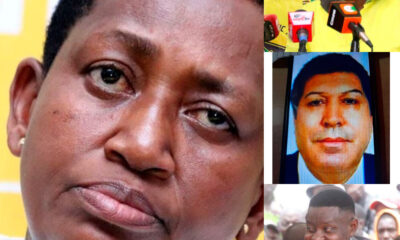
 Investigations1 week ago
Investigations1 week agoHow Close Ruto Allies Make Billions From Affordable Housing Deals



